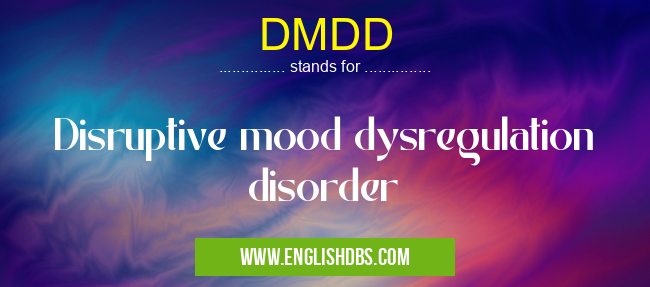What does DMDD mean in THERAPY
Disruptive mood dysregulation disorder (DMDD) is a type of mental health condition that affects children and adolescents. It involves difficulty in regulating emotions and behavior, including severely outbursts and frequent temper tantrums. DMDD is characterized by frequent temper outbursts that are not appropriate for the child’s age or development level, as well as extreme irritability throughout the day. It is important to note that while both boys and girls can have DMDD, it occurs more commonly in boys than girls.

DMDD meaning in Therapy in Medical
DMDD mostly used in an acronym Therapy in Category Medical that means Disruptive mood dysregulation disorder
Shorthand: DMDD,
Full Form: Disruptive mood dysregulation disorder
For more information of "Disruptive mood dysregulation disorder", see the section below.
Symptoms of DMDD
People with DMDD often experience severe temper outbursts multiple times per week. These are out of proportion to a given situation, and can include verbal aggression such as yelling or swearing, physical aggression such as hitting or kicking, property damage such as throwing objects, or self-harm such as head banging. Also, individuals with DMDD will display persistent irritability most days for at least one year. This irritability can manifest itself through angry outbursts, defiance towards authority figures, decreased participation in activities previously enjoyed by the individual and a tendency towards extreme negative thinking about oneself and life circumstances.
Diagnosis of DMDD
A diagnosis of DMDD should be made by a licensed mental health professional after a full evaluation has been conducted. To be diagnosed with DMDD, an individual must display frequent episodes of severe temper outbursts along with persistent irritability for at least one year without any significant improvements in mood or behavior over time despite interventions from caregivers. A diagnosis should also not be made if the individual has had any other diagnoses that might explain their symptoms better.
Treatments for DMDD
Treatment options for those with DMDD typically involve psychotherapy combined with medication management if necessary. Psychotherapy can help an individual learn how to better regulate their emotions and behavior by teaching effective techniques such as stress management strategies or mindfulness practices. Medications may also be used to help reduce irritability associated with the disorder. A combination of psychotherapy and medications may provide the best treatment option for those struggling with this condition.
Essential Questions and Answers on Disruptive mood dysregulation disorder in "MEDICAL»THERAPY"
What is Disruptive mood dysregulation disorder (DMDD)?
Disruptive mood dysregulation disorder (DMDD) is a childhood mental health condition, characterized by severe and frequent outbursts of anger, temper tantrums, and an overall negative and irritable mood. Children with DMDD have difficulty regulating their emotions in response to difficult situations or stressful events.
What are the common symptoms of DMDD?
Common symptoms of DMDD include persistent temper outbursts that are disproportionate to the situation at hand, accompanied by irritability or angry/aggressive behaviour most of the day, for more days than not. Other symptoms include difficulty tolerating frustration, poor impulse control, physical aggression towards others or objects, being easily provoked and intolerant of minor frustrations.
Who is typically diagnosed with DMDD?
DMDD is most commonly diagnosed in children between 6-18 years old who struggle with emotional regulation on an ongoing basis. It may be seen in combination with other mental health disorders such as depression or anxiety.
How can I tell if my child has DMDD?
If your child often displays intense outbursts of anger and irritability that seem disproportional compared to the situation at hand, it may be worth speaking to a healthcare professional. Additionally, signs such as difficulty tolerating frustration; poor impulse control; physical aggression towards others or objects; being easily provoked and impatient could suggest your child has issues regulating their emotions.
What causes DMDD?
The exact cause of DMDD remains unknown but it is thought that genetics and neurology may play a role in the development of this illness. Environmental factors such as trauma or neglect could also contribute to the onset of this disorder.
Are there any long-term impacts associated with DMDD?
Yes – if left untreated, DMDD can lead to significant long-term impacts on children’s functioning in areas such as school performance and social interactions which could continue into adulthood if not addressed properly.
How is DMDD treated?
Treatment for this condition usually involves psychotherapy together with medication depending on the severity of the case. Cognitive behavioural therapy (CBT) has been found particularly effective in helping individuals learn how to manage their emotions better and cope with difficult situations constructively rather than resorting to explosive outbursts.
Where can I find help for my child's DMDD?
Speak to your family doctor who will then refer you onto specialist services available for children likely suffering from this condition such as Child & Adolescent Mental Health Services (CAMHS). There are also support groups available both online and offline for families experiencing similar difficulties so they don’t feel alone in managing their circumstances.
Final Words:
In conclusion, Disruptive Mood Dysregulation Disorder (DMDD) is a type of mental health condition that affects children and adolescents that involves difficulty regulating emotions and behavior including outbursts and frequent temper tantrums. While there is no cure for this disorder, treatment options like psychotherapy combined with medication management may help individuals manage their symptoms more effectively so they can live happier lives.
